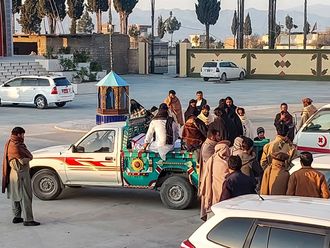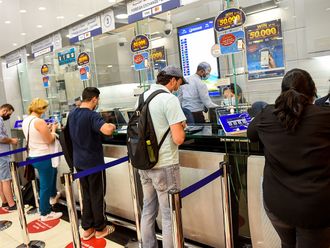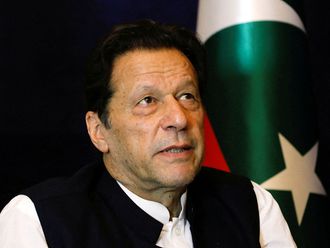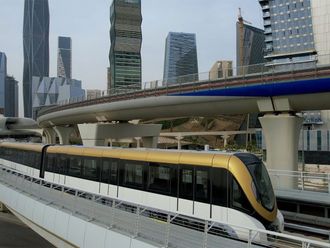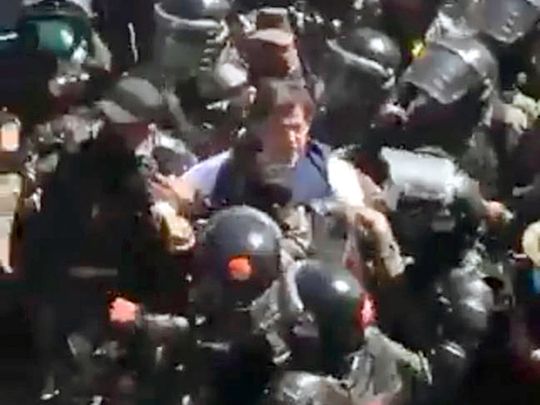
Islamabad: Former Pakistan Prime Minister Imran Khan has been taken into custody at the Islamabad High Court (IHC) by a paramilitary force, reports said on Tuesday.
Fawad Chaudhry, a senior official with the Pakistan Tehreek-e-Insaf (PTI) party said the 70-year-old Khan was arrested on the premises of the court by agents from the country's anti-corruption body, the National Accountability Bureau.
Chaudhry said Khan was dragged out of the court and into a police vehicle. He said the former premier is now in the custody of the security forces. He denounced the arrest as “an abduction.”
"Imran Khan has been arrested in the Qadir Trust case," the official Islamabad police Twitter account said, referring to a graft case in which the former prime minister and his wife have been accused of receiving “billions of rupees from a real estate firm for legalising a laundered amount of Rs 50 billion.”
Khan was ousted in a no-confidence vote in April 2022. He has claimed his ouster was illegal and a Western conspiracy and has campaigned against the government of his successor, Prime Minister Shahbaz Sharif, demanding early elections.
After the former premier was whisked away, a scuffle broke out between Khan’s supporters and police. Chaudhry said some of Khan's lawyers and supporters were injured in the scuffle, as were several policemen.
At least one person was reported killed in clashes between protesters and the military in Quetta, the capital of Balochistan province, with another five people wounded there, while about 15 injuries were reported amid similar violence in Karachi, Peshawar, Rawalpindi and Lahore. Police fired tear gas to disperse demonstrations.
Amid the violence, officials at Pakistan’s telecommunication authority said regulators blocked social media, including Twitter, and internet service was suspended in the capital of Islamabad and other cities. Classes at some private schools were cancelled for Wednesday.
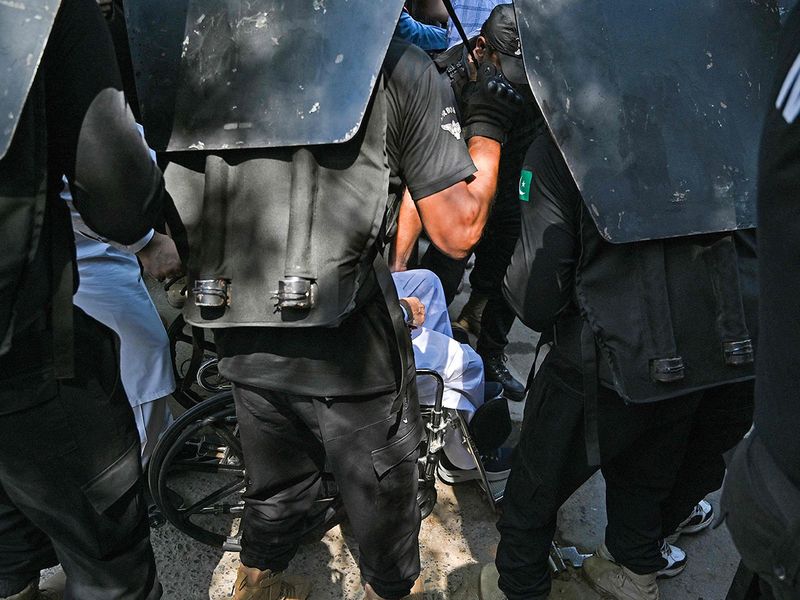
According to Geo News, the PTI chairman was going for biometric at the IHC when he was taken into custody. The NAB officials had arrest warrants.
Following Khan’s arrest, IHC Chief Justice Aamer Farooq took notice of the matter, and summoned the Islamabad IG and the interior secretary within “15 minutes”.
To be produced before court n Wednesday
He also directed the additional attorney general to appear before the court in 15 minutes and instructed him to immediately find out who was behind the arrest.
“If an inquiry has to be conducted, action will also be taken against the prime minister and ministers,” the chief justice said.
Justice Farooq further asked: “Tell us in which case the arrest was made?”
The Islamabad advocate general then requested that the court extend the time of 15 minutes to half an hour; however, the request was rejected and he was ordered to appear in 15 minutes.
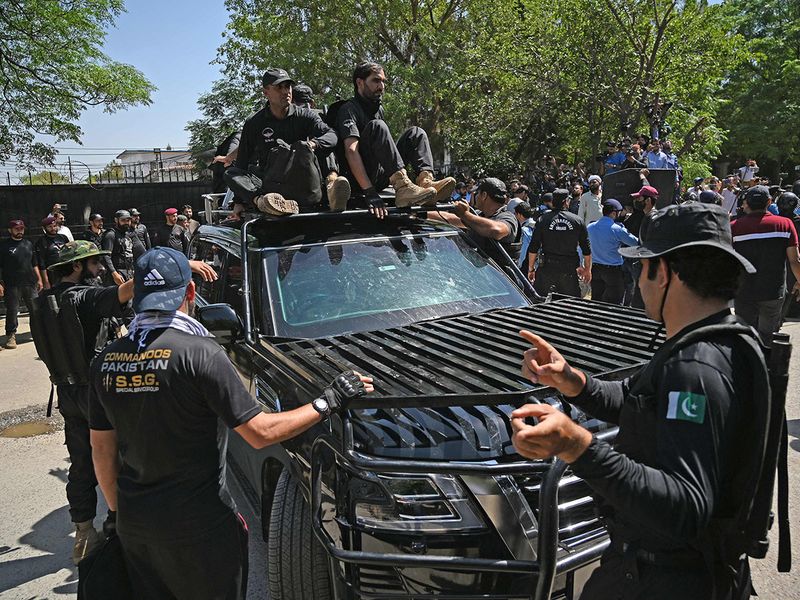
Officials from the anti-corruption body said that Pakistan’s National Accountability Bureau had issued arrest warrants for Khan last week in a separate graft case, for which he had not obtained bail — something that would protect him from arrest under the country's laws.
The officials, who spoke on condition of anonymity, said Khan will be brought to appear before an anti-graft tribunal on Wednesday.
Pakistan military warning
Late on Monday, Pakistan’s military warned Khan against making “baseless allegations” after he again accused a senior officer of plotting to kill him.
The rebuke late Monday underscored how far Khan’s relations have deteriorated with the powerful military, which backed his rise to power in 2018 but withdrew its support ahead of a parliamentary vote of no confidence that ousted him last year.
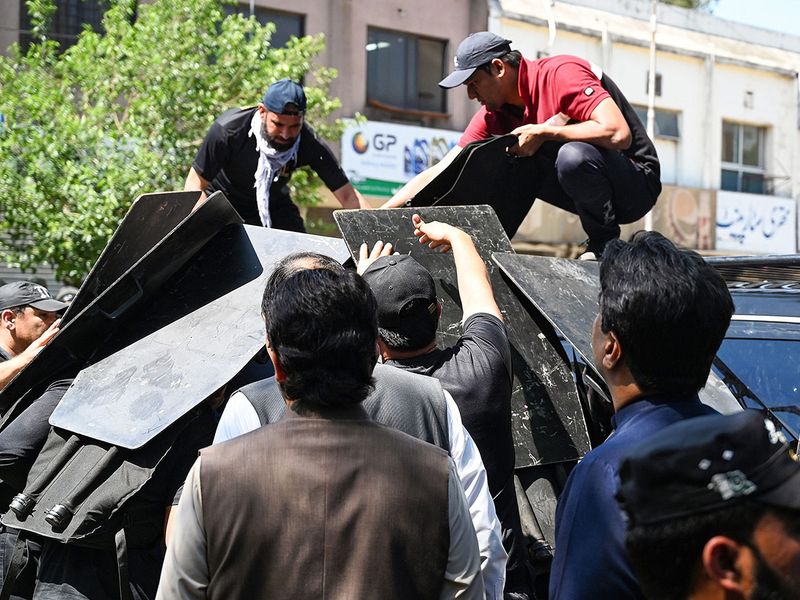
At a weekend rally in Lahore, Khan repeated claims that a senior intelligence officer Major-General Faisal Naseer was involved in an assassination attempt last year during which he was shot in the leg.
The military’s Inter-Services Public Relations (ISPR) wing said in a statement that “this fabricated and malicious allegation is extremely unfortunate, deplorable and unacceptable”.
“This has been a consistent pattern for the last year wherein military and intelligence agencies officials are targeted with insinuations and sensational propaganda for the furtherance of political objectives,” it said.
Prime Minister Shehbaz Sharif - whom Khan also alleged was involved in the assassination plot - weighed in on Twitter.
“His levelling of allegations without any proof against Gen Faisal Naseer and officers of our Intelligence Agency cannot be allowed and will not be tolerated,” he said.
Moved to Rawalpindi
Khan was later moved to the garrison city of Rawalpindi, near Islamabad, where he was to be questioned at the offices of the National Accountability Bureau. He was also to undergo a medical checkup, according to procedure, police said.
Khan had arrived in Islamabad earlier on Tuesday from the nearby city of Lahore, where he resides, to face charges before the Islamabad High Court in multiple graft cases. He has claimed that the cases, which include terrorism charges, are a plot by Sharif’s government to discredit him.
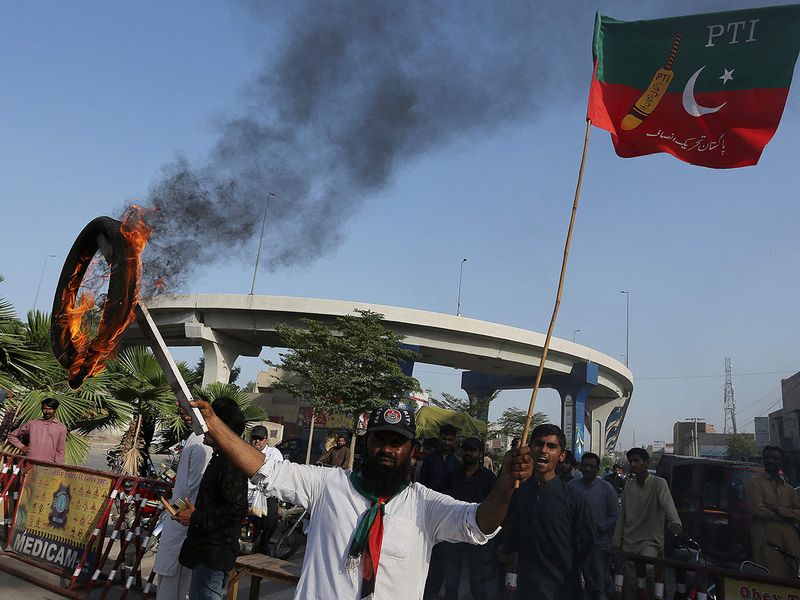
At a news conference, Law Minister Azam Tarar said Khan was arrested because he was not cooperating with the investigations. He also denounced the violence by Khan supporters, saying that protests must remain peaceful.
“It should have not happened,” he said, shortly after TV video emerged of burning vehicles and damaged public property in parts of the country.
Authorities said they have banned rallies in the eastern province of Punjab.
As the news of the arrest spread, about 4,000 of Khan’s supporters stormed the official residence of the top regional commander in Lahore, smashing windows and doors, damaging furniture and staging a sit-in as troops there retreated to avoid violence. The protesters also burned police vehicles and blocked key roads.
Protesters also smashed the main gate of the army’s headquarters in the garrison city of Rawalpindi, where troops exercised restraint. Hundreds of demonstrators shouted pro-Khan slogans as they moved toward the sprawling building.
In the port city of Karachi, police swung batons and fired tear gas to disperse hundreds of Khan supporters who had gathered on a key road.
The arrest is “blatant interference in the judicial affairs by the powers-that-be,” Raoof Hasan, another leader from Khan’s party, told Al Jazeera English television. “We are completely in the dark. He was virtually abducted from the court of law.”
In the port city of Karachi, police swung batons and fired tear gas to disperse hundreds of Khan supporters who had blocked a key road. Police were also trying to disperse demonstrators in Lahore, who briefly blocked key roads there as they rallied, mostly peacefully, against Khan’s arrest.
“Imran Khan has been arrested because he was being sought in a graft case,” Interior Minister Rana Sanaullah Khan told a news conference. He claimed Khan had caused millions of dollars in losses to the country’s treasury by illegally purchasing lands from a business tycoon while in office.
The arrest came hours after Khan issued a video message before heading to Islamabad, saying he was “mentally prepared” for arrest — an indication he may have known what awaited him in the capital.
Rejects findings
Pakistan’s government has said the assassination attempt was the work of a lone gunman, who is now in custody and who confessed in a video controversially leaked to media.
Khan rejects those findings and insists authorities have refused to accept his attempts to file a so-called first information report (FIR) with police identifying the real culprits.
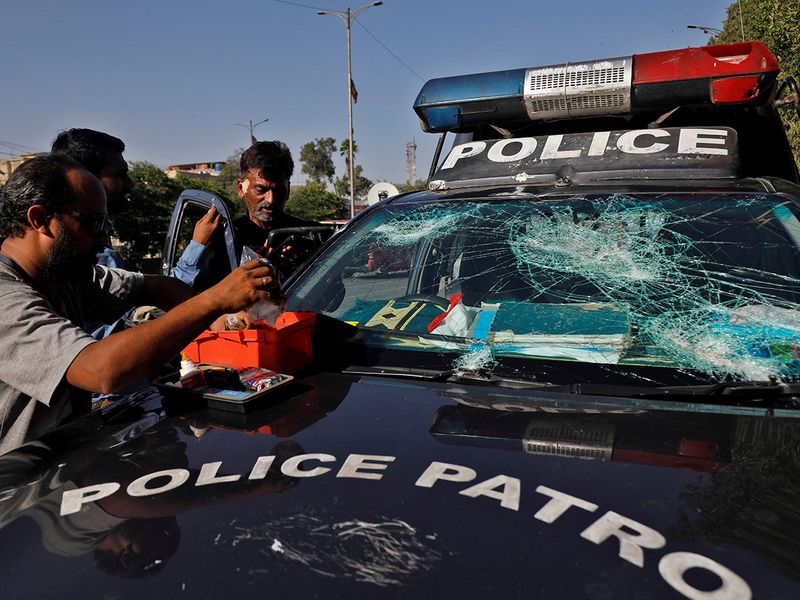
Khan repeated his allegations in a video statement released on Tuesday, saying that “there is no reason for me to fabricate the facts”.
ISPR said it reserved the right to “take legal course of action against patently false and malafide statements and propaganda”.
Khan faces dozens of charges that were brought against him since he was ousted.
Ahead of general elections in October, a myriad of petitions and appeals are pending before the courts for an earlier vote for some provincial assemblies, which are usually held at the same time.
Pakistan’s economy has also been pushed to the brink of collapse by years of financial mismanagement, exacerbated by a global energy crisis and devastating floods that submerged a third of the country in 2022.
The government is battling to revive the next tranche of a $6.5 billion loan deal agreed with the International Monetary Fund in 2019.
The IMF is demanding more stringent reforms, including tax rises and subsidy cuts, likely to rile voters ahead of an election.
Pakistan must also win guarantees of bilateral support from friendly nations to unlock the tranche, with China, Saudi Arabia and the United Arab Emirates already pledging loans.


